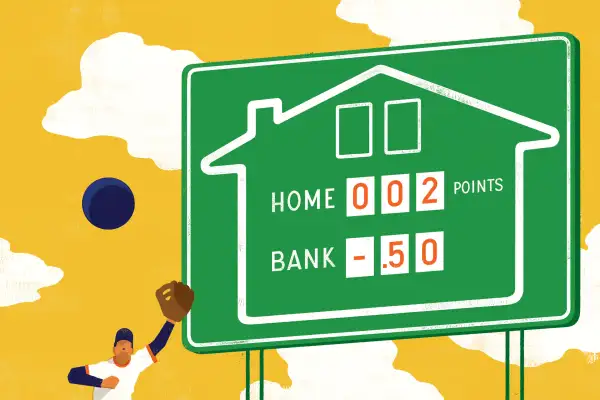Buying Mortgage Points Can Lower Your House Payments. But What the Heck Are They?

Elevated mortgage rates and historically high home prices have crushed housing affordability over the last few years. But what if there's a way to lower your monthly payment when buying a home?
Whether you're trying to buy or refinance a home, your mortgage lender determines your mortgage rate based on criteria like your credit history and income. If you’re willing to do some careful calculations, there’s a lesser-known way get a better interest rate and save cash over the long haul: buying mortgage points.
What are mortgage points?
When you apply for a home loan, you’ll have the opportunity to buy mortgage points, or "buy down your rate." Each point costs 1% of your loan amount and lowers your interest by a fractional amount.
“Mortgage points, or discount points, allow you to pay more in closing costs in exchange for a lower mortgage rate,” says Lucy Randall, director of sales at mortgage lender Better.com. “That means you’ll have a bigger upfront fee, but a lower monthly payment over the life of your loan.”
The exact amount that a point can lower your rate varies, depending on your loan, lender and the overall investment market. Usually, it’s anywhere from one-eighth to one-quarter of a percent, Randall says.
Here’s an example of points in action: Say you were quoted 7% interest rate on your $400,000 loan but were really hoping for a 6.5% rate. Points could help you achieve that.
Typically, one point will lower your rate by 0.25%, so to lower your rate by 0.5%, you’d need to buy two points. At 1% of your loan amount each, or $2,000, that would mean a grand total of $4,000 to snag that 6.5%% rate you were gunning for (and $133 off your monthly payment). Points don’t have to be round numbers. If you only wanted to lower your rate slightly, you could buy half a point, for example. In the previous scenario, that would mean a rate of 6.375% — a reduction of 0.125.
There aren’t any hard-and-fast limits on how many points you can buy. According to Randall, though, “You'll rarely find a lender who will let you buy more than around four.”
Are mortgage points worth it?
Mortgage points clearly have advantages, helping borrowers snag a lower rate and save on interest in the long-term. But for some, they could be a costly mistake.
“There is an emotional pull with homebuyers because they think they want the lowest rate available, but it doesn’t always work in their best interest,” says Omeed Salashoor, sales manager and certified mortgage planning specialist at mortgage company Homebridge. “Buying points works for the buyer when they anticipate staying in the house for a significant period of time.”
That last part is key when determining if points are a smart investment. Because points come with an upfront fee, you’ll need to make sure you stay in the home long enough to recoup the costs. If you know it’s your forever home and you plan to live there for the long haul, then you’re probably safe.
But if it’s a starter home or you only expect to stay there a few years, that’s where it gets murkier.
Let’s return to our previous scenario, where you paid $$8,000 to lower your interest rate to 6%, shaving $133 off your monthly payment. You’d need to stay in the home until at least the breakeven point to make that investment worth it. In this case, that would be about 60 months, or just over five years. If you’re not sure you’ll keep the property that long, then points probably aren’t the best move.
“Paying mortgage points can save you money over the life of your home loan if you don’t sell or refinance for many years,” Randall says. “Understand, though, that the upfront investment can be substantial.”
You should also consider how buying points impacts your down payment. If paying for points would eat into the cash you intend to put down, you might want to think twice. Making a down payment of less than 20% would generally mean owing private mortgage insurance, which costs around $30 to $70 per month for every $100,000 borrowed, which can add up.
Why do mortgage points exist?
Mortgage points encourage borrowers to keep their loans longer, offering a potentially extended period of profits for lenders and investors in the mortgage market.
“Points are beneficial from the lenders’ and investment community’s perspective in that it discourages serial refinancing and prepayments,” says Marina Walsh, vice president of industry analysis at the Mortgage Bankers Association. “That steadiness is what the investor community is looking for. They know the loan won’t prepay, which means they’d lose their investment at that point in time.”
Though lenders don’t have any outright guarantees that a borrower with points will keep their loan longer, there’s certainly the extra motivation to do so. As Walsh puts it, a borrower who pays for points “has to think long and hard about refinancing.” If they haven’t recouped the costs of those points yet, they could lose out on money — plus owe the additional fees and closing costs for refinancing on top of that.
It’s this potential for extended returns that makes investors willing to accept lower interest rates. Keep this in mind if a lender offers you a lower rate, and be extra sure the points work in your favor, not just the investor’s.
Lender credits
Points aren’t the only way you can wheel and deal with your rate. If you’re willing to go the other direction and take on a higher interest rate, your lender can give you a credit.
A lender credit works like points, but in reverse, and it helps lower your costs at closing. They can make sense if you don’t have much saved for your upfront costs but know you can make a higher monthly payment.
Credits aren’t ideal if you plan to be in the home for an extended period of time because they come with much higher interest costs in the long run. If you do plan to stay a while, you’ll want to refinance when possible to reduce your costs.
More from Money:
What Are Home Improvement Loans and How Do They Work?
Down Payment Assistance: These States Will Give You Money to Buy a House


